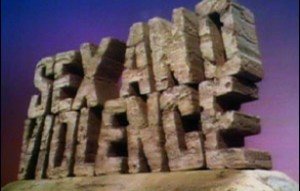The Muppet Show: Sex and Violence
After the first Muppet Show pilot, The Muppets Valentine Show, failed to be picked up to series, Jim Henson and Co. shot yet another pilot in December 1974, which like Valentine, made it to air as a special on ABC (this one in March 1975) but the network similarly opted to not take it any further. And as much as I sympathize with the frustration Jim must have felt, I can’t actually say that I entirely either disagree with or don’t understand ABC’s decision. Although, as with Valentine, this special, Sex and Violence–available as a bonus feature on The Muppet Show Season 1 DVD set–displays many of the features that would become beloved Muppet Show staples, this show has still not yet found its voice.
In fact, while in some ways, this show is much closer to The Muppet Show that we recognize than Valentine, in others, it actually feels like a significant step backwards. One of the most telling signs of this is the humor, which–ironically, given the in-your-face title, which Jim insisted upon despite network handwringing–is more restrained than in the previous pilot. The Muppets’ subversive edge is watered down from the gleefully cheeky bite that generally defines the Muppets and was on full display in Valentine. At their greatest, the Muppets are ever-so-slightly “perverted,” as Muppet puppeteer Richard Hunt described them, but with a great deal of warmth and heart. Sex and Violence, however, manages to be less biting and less sweet than Valentine/the Muppets’ best.
Valentine‘s major issue was a lack of clearly defined purpose/format and not having a strong host. Rather than improving upon that, Sex and Violence almost doubles down on all of the negatives. For a host, Valentine had the rather unmemorable Wally, who kept to his typewriter and therefore felt disengaged from most of the action. Sex and Violence has Nigel, who looks a bit like a cross between a frog and a Fraggle, and at least takes a slightly more active role with the other characters in trying to get the show to run smoothly, but has an even less defined personality, coming across as downright boring compared to the outlandish creatures surrounding him, whose larger-than-life antics seem to make him practically fade into nothingness. Perhaps as a tribute to his brief time as the host, Nigel would reappear on The Muppet Show as the house orchestra’s conductor.
What Sex and Violence really needs is Kermit taking the central role to make up for Valentine‘s under-use of him (one of its biggest flaws), but instead, there’s even less Kermit here than before. He doesn’t get a single musical number and only has a throwaway line in a dance sequence, in addition to silently appearing in the audience of a wrestling match sequence. The reason for this is that Jim actually wanted to step back a bit from daily performing duties and to instead be more of a background creative, freeing up more of his time to pursue other artistic goals, but he clearly underestimated Kermit and his importance to the Muppets’ formula.
And while Sex and Violence makes a format improvement by moving the action to a TV studio rather than the non-descript house in which the Muppets resided in Valentine, the worldbuilding still feels majorly underdeveloped. The Muppet Show is about the joy of this family of misfits putting on an anachronistic vaudeville variety show in a rundown old theatre. While Sex and Violence features a running backstage story about a “Seven Deadly Sins” pageant that is going to be on the air by the end of the half-hour, it never strictly defines or establishes what this show-within-the-show really is. The backstage sequences are completely separate from the sketches we see “on the air,” with no bridging devices to either introduce them or create any sort of framework linking them together. Even before learning the backstory in The Muppet Movie, we could glean a history from The Muppet Show of Kermit assembling his friends to put on this weekly theatrical show that meant so much to him. Nigel doesn’t exude any similar sense of passion.
While Valentine‘s attempts to create a narrative structure were a bit hamfisted and clunky at times, the sketches at least all felt part of the same piece. Sex and Violence‘s sketches aren’t really about sex or violence (it opens upon Crazy Harry blowing up a sign that reads “SEX AND VIOLENCE” as an off-stage announcer declares “the end of sex and violence on television”), and neither are they even about the Seven Deadly Sins, which could have been an amusing throughline.
Instead, it’s a parade of random Muppet stuff, some of it very good and most of it at least interesting from a historical perspective, but–with no real structure in place–it doesn’t seems to have an overall point. The irony is that, in its bouncing around almost haphazardly from sketch to sketch (reminiscent of Monty Python’s Flying Circus), the special should feel more tonally imbued with the Muppets’ special brand of chaos and anarchy than Valentine, which was overly sappy and even slow in spots, and yet, despite the title and pacing, this script is less subversive and even less naughty. Valentine had some almost shockingly implied sex jokes, from references to how host Mia Farrow got pregnant to the depiction of the Koozebanian mating ritual, whereas, shockingly, Sex and Violence itself has none!
Also–with the exception of the terrific final shot which zooms out to reveal Jim and the other puppeteers underneath the Muppets, dancing around the stage–it doesn’t feature a single human being in the entire episode, which, when it comes to the Muppets, is almost always a misstep. As brilliant as the Muppets are, they have always practically required interaction with humans for their magic to reach its full potential. It’s a strange paradox that having these felt-and-foam creations in the same room with a real person only helps make them seem more real. It almost requires at least one person, entirely convinced of the Muppets’ reality, to take us as an audience along for the ride. There’s also just something electric about the chemistry between the Muppets and an excellent guest star who’s perfectly keyed into their wavelength, and even when that person isn’t, the Muppets sometimes even use that to their advantage, playing off of that awkwardness in imaginative ways. But, regardless, without a human, the rhythm is ever so slightly thrown off, making Sex and Violence feel even more just-not-right.



